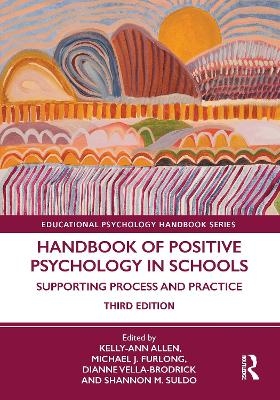
Handbook of Positive Psychology in Schools
Routledge (Verlag)
978-0-367-85586-4 (ISBN)
Kelly-Ann Allen is Senior Lecturer in the Faculty of Education, Monash University, Australia, and Honorary Senior Fellow of the Centre for Wellbeing Science in the Melbourne Graduate School of Education at the University of Melbourne, Australia. She is a Fellow for the Australian Psychological Society and the College of Educational and Developmental Psychologists and is currently Editor-in-Chief of the Educational and Developmental Psychologist as well as Co-Founder and Co-Editor-in-Chief of the Journal of Belonging and Human Connection. In 2020, Dr Allen was recognized by the The Australian as one of Australia’s top 40 early career researchers, listed within the top five for her discipline. Michael J. Furlong is Distinguished Professor Emeritus and Research Professor in the International Center for School-Based Youth Development at the University of California Santa Barbara, USA. There, he is also Principal Investigator of Project Covitality, which supports schools’ efforts to foster social-emotional development for all students. He is currently Associate Editor of the Educational and Developmental Psychologist. He was awarded a 2021–2022 University of California Edward A. Dickson Emeritus Professorship. Dianne Vella-Brodrick is Professor and Gerry Higgins Chair in Positive Psychology at the Melbourne Graduate School of Education and Deputy Director and Research Director at the Centre for Wellbeing Science at the University of Melbourne, Australia. She founded the Australian Positive Psychology Network and directed the inaugural Master of Applied Positive Psychology program at the University of Melbourne. She is a Fellow and serves on the Council of Advisors of the International Positive Psychology Association. Dianne is also the founder of the innovative Bio-Dash wellbeing program which aims to make learning about well-being engaging for students through the use of biofeedback. Shannon Suldo is Professor and Director of Clinical Training in the School Psychology Program at the University of South Florida, USA. There, she is Principal Investigator of a federally funded study to evaluate the efficacy of the Well-Being Promotion Program, a manualized small group positive psychology intervention for middle school students with low life satisfaction. She is a Licensed Psychologist and provides school-based mental health services to youth in the Tampa area. She is currently Associate Editor of School Mental Health and President of the Society for the Study of School Psychology.
SECTION I: CONCEPTUAL AND THEORETICAL FOUNDATIONS 1. A Selected Introduction to the Science and Practice of Positive Psychology in Schools 2. PERMAH: A Useful Model for Focusing on Wellbeing in Schools 3. Capacities and Vulnerabilities in the Classroom: Self-Determination Theory and the Promotion of Proactive Human Nature among Students 4. Covitality: Cultivating Psychosocial Strengths and Well-Being 5. Adapting the Dual-Factor Model for Universal School-Based Mental Health Screening: Bridging the Research to Practice Divide SECTION II: INDIVIDUAL PSYCHOLOGICAL ASSETS 6. Wellbeing Literacy: Language Use as a Way to Contextualize the Process of Positive Education 7. Optimism in the Classroom and Beyond 8. Gratitude in School: Benefits to Students and Schools 9. Cultivating Mindfulness in Schools to Promote Well-Being 10. Social Emotional Learning: What are the Learning Outcomes from a Preschool SEL Program (COPE-Resilience) in Taiwan and Australia 11. Physical Activity and Sport 12. Conceptualizations of Well-being during Middle Childhood: Investigating Developmental Shifts through Visual Narrative Analysis 13. Academic Self-Concept: A Key Construct for Positive Psychology 14. Empathy: A Necessary Ingredient in School-Based Social-Emotional Health and Equity 15. Integrating Assessment into School Environments to Promote Students’ Psychological Well-Being 16. Coming Together: A comprehensive Overview of the Transdisciplinary Perspectives of School Belonging 17. Academic Self-Efficacy 18. Flow in Schools Reexamined: Cultivating Engagement in Learning from Classrooms to Educational Games 19. Promoting Students’ Growth Motivation: Mastery-Structured Classrooms 20. Students’ Growth Orientation: Implications for their Academic Flourishing 21. Achievement Emotions 22. Creativity in the Schools: Creativity Models and New Directions SECTION III: WHOLE SCHOOL CLIMATE AND CULTURE 23. Prosocial Approaches to School Climate Improvement: Definitions, Measurement, and Improvement Strategies for Thriving Schools 24. Positive Psychology and School Discipline 25. Understanding and Promoting School Satisfaction in Children and Adolescents 26. Student Voice: Youth Disrupting Barriers to Achieving the Good Life SECTION IV: POSITIVE EDUCATION IN PRACTICE 27. Using Theory of Change for Fostering Well-being and Engagement in Learning Communities 28. Tracking the Effects of Positive Education around the World 29. Enhancing Well-Being in Youth: Positive Psychology Interventions for Education in Britain 30. Application of Positive Psychology in Chinese School Contexts 31. Applications of Positive Psychology in Spain: Strengths-Based Interventions in Diverse Spanish School Ecosystems 32. Measuring and Promoting Resilience in Youth SECTION V: PERSPECTIVE 33. "Smart" Technology has an Important Role to Play in Making Learning about Well-being in Schools Engaging and Real for Students 34. Using Experience Sampling Methods to Understand How Various Life and School Experiences Affect Student Well-being 35. The Use of Positive Psychology Intervention to Foster Teacher Well-being
| Erscheinungsdatum | 23.03.2022 |
|---|---|
| Reihe/Serie | Educational Psychology Handbook |
| Zusatzinfo | 34 Tables, black and white; 22 Line drawings, black and white; 13 Halftones, black and white; 35 Illustrations, black and white |
| Verlagsort | London |
| Sprache | englisch |
| Maße | 178 x 254 mm |
| Gewicht | 453 g |
| Themenwelt | Geisteswissenschaften ► Psychologie ► Pädagogische Psychologie |
| Medizin / Pharmazie ► Medizinische Fachgebiete ► Psychiatrie / Psychotherapie | |
| Sozialwissenschaften ► Pädagogik ► Didaktik | |
| ISBN-10 | 0-367-85586-0 / 0367855860 |
| ISBN-13 | 978-0-367-85586-4 / 9780367855864 |
| Zustand | Neuware |
| Informationen gemäß Produktsicherheitsverordnung (GPSR) | |
| Haben Sie eine Frage zum Produkt? |
aus dem Bereich


